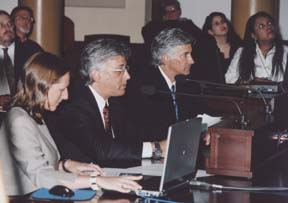 |
||||||||
| MEMO BLOG | Memo Calendar | Memo Pad | Business Memos | Loaves & Fishes | Letters | Home | ||
LEE PERLMAN
THE MID-COUNTY MEMO
 |
| Testifying at the City Council hearing on code changes for Northeast 122nd Avenue last month are, from left, Consultant Gwenn Baldwin, brothers Brad and Ed Tonkin. Council, ignoring its policy acceded to the Tonkins' zone change requests. |
| MEMO PHOTO: TIM CURRAN |
Council members called their votes on the amendments "preliminary," and said that they could be changed at a second hearing planned for June 28, when they are scheduled to vote on the proposed regulations as a whole. However, a reversal of even one of the five votes, let alone the three necessary for a change in the outcome, appears highly unlikely.
On the 28th as well, council was to consider an amendment by grocery giant Safeway, allowing the store to install gas pumps at its Northeast 122nd Avenue and Glisan Street store.
The study would modify the regulations in place within a quarter mile of the 122nd Avenue MAX light rail station. It is an attempt to allow the dealerships on the street to operate and grow while preserving the city's intent to create high-density pedestrian-oriented development near the station. A team of planners led by Senior Planner Barry Manning drafted the amendments and a 14-member committee composed of representatives of designated stakeholders. Leonard's amendments would have the following effect on the proposals:
1. Leonard's amendments shrink the "nodes" where the regulations would retain most of their force, and increase the areas where the rules would be relaxed. Specifically, they would exclude from the rules the Hanson Property, site of the Multnomah County Sheriff's Office at 12240 N.E. Glisan St. The county has indicated interest in selling the property when and if it acquires an alternate site. Tonkin representatives have indicated that they are interested in the property, but only if they could have exterior auto storage there. The Hazelwood Neighborhood Association is strongly opposed to having the property become yet another dealership.
2. Leonard's amendments increase the allowed street frontage dedicated to parking and auto storage from the recommended 50 percent to 70 percent.
3. Leonard's amendments increase the allowed front setback outside the node area to 24 feet. Staff had recommended 20 feet. The current maximum is 10 feet, and cars currently cannot be parked or displayed in this space.
4. Leonard's amendments require all land in the study area currently zoned CM (mixed housing/commercial) to be re-zoned CX (high density commercial). For the most part, this agrees with staff recommendations. However, it would include an area on the west side of 122nd Avenue on East Burnside Street that staff never proposed to re-zone.
Brad Tonkin complained, "The current zoning on 122nd makes it impossible for dealerships to thrive." He thanked Manning for "setting a tone of compromise" in drafting the regulations, and said that in terms of meeting all agendas, the amendments were "very close to making it happen with a very few changes." However, he complained that the Portland Planning Commission, in reviewing the stakeholder committee's proposal, had "drastically reduced the area allowed for exterior display."
Manning had proposed nodes extending 200 feet in all directions at Northeast Glisan and Southeast Stark streets, and 300 feet in all directions at East Burnside Street. The Planning Commission instead tried to make the node boundaries conform to existing property lines and provide for a pedestrian connection to the residential neighborhoods to the east.
Ed Tonkin added two arguments - the economic importance of the business and its desire to make it aesthetically pleasing. Noting that Tonkin had done business on the avenue since 1965, he said it "brings 100,000 people a year to the area and provides 800 jobs. This will remain the heart of our business." He mentioned that the company contributes $20 from every vehicle sale to the Portland Public Schools Foundation. Not only is it willing to have well-designed dealerships, but manufacturers demand that it does, he said.
Tonkin presented a rendering of a possible dealership on the Hanson property, one that "doesn't overwhelm the site, has no sea of cars...By removing a few barriers, we can have the community vision we hope for."
The Tonkins made similar arguments at the last Planning Commission hearing - a session that had been billed as a chance to clear up "minor issues." The commission declined to change its recommendations. Planning commission member Ingrid Stevens argued that the group had already "bent over backward" to accommodate the auto dealers. The council, and especially Leonard, proved more pliable. Leonard recalled three years ago when the Bureau of Development Services, under his jurisdiction, had rejected an application for a new Ron Tonkin Honda building, "and I had to read about it in the papers.... At no time did the Tonkins call me, nor did they threaten to leave the area." Under pressure from Leonard, BDS staff deemed what originally they judged to be a new building as a "remodel," and approved it. Leonard has been calling for changes in the regulations ever since.
"I'm struck with the comment that this is a pedestrian area," Leonard said. "That's not my first impression. It's fraught with some of the most challenging problems the city has. Dealerships are a good thing if done in the right way...I have a problem with the idea that we're 'liberalizing' (the zoning code). We're restricting what has been allowed."
>>continued
 |
 |
 |
MEMO Advertising | MEMO Archives | MEMO Web Neighbors | MEMO Staff | Home